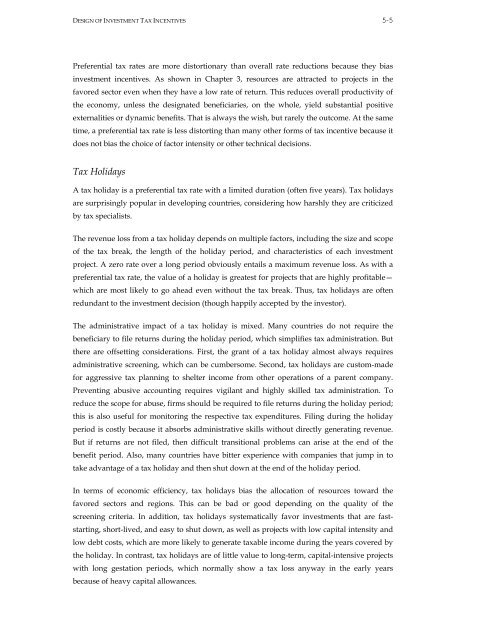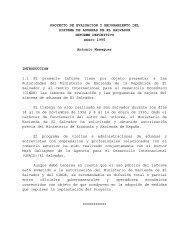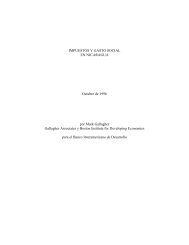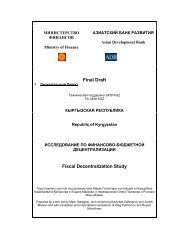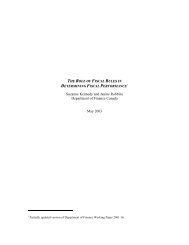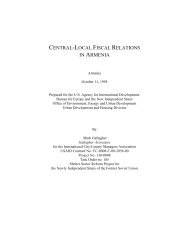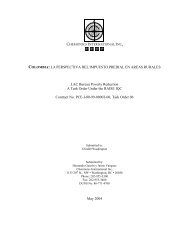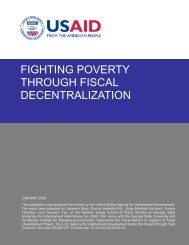Effectiveness and Economic Impact of Tax Incentives in the SADC ...
Effectiveness and Economic Impact of Tax Incentives in the SADC ...
Effectiveness and Economic Impact of Tax Incentives in the SADC ...
Create successful ePaper yourself
Turn your PDF publications into a flip-book with our unique Google optimized e-Paper software.
DESIGN OF INVESTMENT TAX INCENTIVES 5-5<br />
Preferential tax rates are more distortionary than overall rate reductions because <strong>the</strong>y bias<br />
<strong>in</strong>vestment <strong>in</strong>centives. As shown <strong>in</strong> Chapter 3, resources are attracted to projects <strong>in</strong> <strong>the</strong><br />
favored sector even when <strong>the</strong>y have a low rate <strong>of</strong> return. This reduces overall productivity <strong>of</strong><br />
<strong>the</strong> economy, unless <strong>the</strong> designated beneficiaries, on <strong>the</strong> whole, yield substantial positive<br />
externalities or dynamic benefits. That is always <strong>the</strong> wish, but rarely <strong>the</strong> outcome. At <strong>the</strong> same<br />
time, a preferential tax rate is less distort<strong>in</strong>g than many o<strong>the</strong>r forms <strong>of</strong> tax <strong>in</strong>centive because it<br />
does not bias <strong>the</strong> choice <strong>of</strong> factor <strong>in</strong>tensity or o<strong>the</strong>r technical decisions.<br />
<strong>Tax</strong> Holidays<br />
A tax holiday is a preferential tax rate with a limited duration (<strong>of</strong>ten five years). <strong>Tax</strong> holidays<br />
are surpris<strong>in</strong>gly popular <strong>in</strong> develop<strong>in</strong>g countries, consider<strong>in</strong>g how harshly <strong>the</strong>y are criticized<br />
by tax specialists.<br />
The revenue loss from a tax holiday depends on multiple factors, <strong>in</strong>clud<strong>in</strong>g <strong>the</strong> size <strong>and</strong> scope<br />
<strong>of</strong> <strong>the</strong> tax break, <strong>the</strong> length <strong>of</strong> <strong>the</strong> holiday period, <strong>and</strong> characteristics <strong>of</strong> each <strong>in</strong>vestment<br />
project. A zero rate over a long period obviously entails a maximum revenue loss. As with a<br />
preferential tax rate, <strong>the</strong> value <strong>of</strong> a holiday is greatest for projects that are highly pr<strong>of</strong>itable—<br />
which are most likely to go ahead even without <strong>the</strong> tax break. Thus, tax holidays are <strong>of</strong>ten<br />
redundant to <strong>the</strong> <strong>in</strong>vestment decision (though happily accepted by <strong>the</strong> <strong>in</strong>vestor).<br />
The adm<strong>in</strong>istrative impact <strong>of</strong> a tax holiday is mixed. Many countries do not require <strong>the</strong><br />
beneficiary to file returns dur<strong>in</strong>g <strong>the</strong> holiday period, which simplifies tax adm<strong>in</strong>istration. But<br />
<strong>the</strong>re are <strong>of</strong>fsett<strong>in</strong>g considerations. First, <strong>the</strong> grant <strong>of</strong> a tax holiday almost always requires<br />
adm<strong>in</strong>istrative screen<strong>in</strong>g, which can be cumbersome. Second, tax holidays are custom-made<br />
for aggressive tax plann<strong>in</strong>g to shelter <strong>in</strong>come from o<strong>the</strong>r operations <strong>of</strong> a parent company.<br />
Prevent<strong>in</strong>g abusive account<strong>in</strong>g requires vigilant <strong>and</strong> highly skilled tax adm<strong>in</strong>istration. To<br />
reduce <strong>the</strong> scope for abuse, firms should be required to file returns dur<strong>in</strong>g <strong>the</strong> holiday period;<br />
this is also useful for monitor<strong>in</strong>g <strong>the</strong> respective tax expenditures. Fil<strong>in</strong>g dur<strong>in</strong>g <strong>the</strong> holiday<br />
period is costly because it absorbs adm<strong>in</strong>istrative skills without directly generat<strong>in</strong>g revenue.<br />
But if returns are not filed, <strong>the</strong>n difficult transitional problems can arise at <strong>the</strong> end <strong>of</strong> <strong>the</strong><br />
benefit period. Also, many countries have bitter experience with companies that jump <strong>in</strong> to<br />
take advantage <strong>of</strong> a tax holiday <strong>and</strong> <strong>the</strong>n shut down at <strong>the</strong> end <strong>of</strong> <strong>the</strong> holiday period.<br />
In terms <strong>of</strong> economic efficiency, tax holidays bias <strong>the</strong> allocation <strong>of</strong> resources toward <strong>the</strong><br />
favored sectors <strong>and</strong> regions. This can be bad or good depend<strong>in</strong>g on <strong>the</strong> quality <strong>of</strong> <strong>the</strong><br />
screen<strong>in</strong>g criteria. In addition, tax holidays systematically favor <strong>in</strong>vestments that are fast-<br />
start<strong>in</strong>g, short-lived, <strong>and</strong> easy to shut down, as well as projects with low capital <strong>in</strong>tensity <strong>and</strong><br />
low debt costs, which are more likely to generate taxable <strong>in</strong>come dur<strong>in</strong>g <strong>the</strong> years covered by<br />
<strong>the</strong> holiday. In contrast, tax holidays are <strong>of</strong> little value to long-term, capital-<strong>in</strong>tensive projects<br />
with long gestation periods, which normally show a tax loss anyway <strong>in</strong> <strong>the</strong> early years<br />
because <strong>of</strong> heavy capital allowances.


